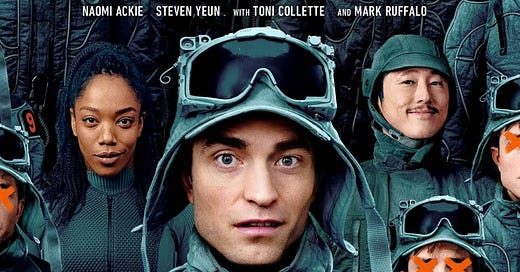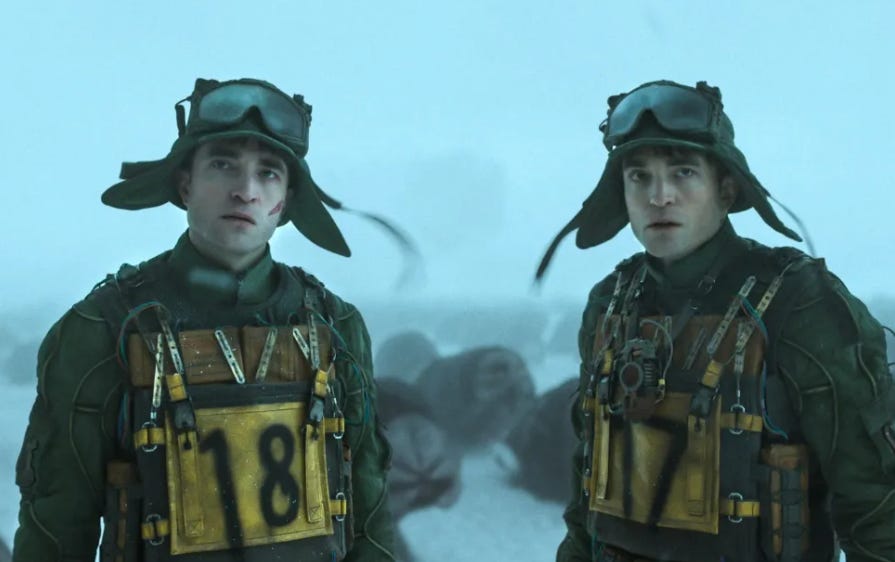"Mickey 17" Makes a Childish Attempt to Make a Point
This thoughtless science-fiction movie doesn't ponder the wonders of its own possibilities
Despite being a quarter-century into the 2000s, Hollywood science-fiction often seems to me stuck in the 20th century.
That’s the case for “Mickey 17,” the new movie from writer-director Bong Joon-Ho. Last we saw him, he was winning Best Picture for “Parasite” at the 2020 Oscars.
His filmography now proves that he loves to mash-up poignant drama with B-movie science-fiction: “The Host,” “Snowpiercer,” “Okja,” and now this one.
The question is, can you do this artfully, making your farce while you Make Your Point?
Joon-ho, worth supposedly $30 million or more, loves to take swipes at rich people via animal-rights issues and legitimate class concerns. He will always Make his Point.
Whether that Point tickles your ideological preferences or not, I must take on Mickey 17’s concept problems, which transcend The Point.
This movie stars Robert Pattinson as the down-and-out Mickey Barnes, a man escaping to a mid-21st-century interplanetary colonization effort because he’s escaping mobsters he’s in debt to.
Unfortunately, he signs up for being an “expendable.” That means he’s essentially a biorobot, a human experiment for the colony effort. They use him to test out space-walking and exo-viruses. He dies in such experiments, and then they print him back up.
By print, I refer to the movie’s main, newer technology, a bio-printer, basically your standard 3-D printer except it makes lifeforms. The Mickey of the title is the 17th one. He has died and been reprinted sixteen times. Thus the perhaps desirable fate of the lower classes in this movie: they’re abused as test-subjects, with the ability to live forever. At least three times, crew members look at Mickey in wonder and ask, “what’s it like to die?”
The movie’s colonization effort is, somewhat like “Snowpiercer,” a hierarchical arrangement, though masked by intermingling on the dank spaceship. For some reason the mission is led by a former Congressman, played hammily by Mark Ruffalo. He and his wife (Toni Collette) force the crew to ration food while they pig out in their more palatial private suite.
They also require the rationing of sex, until the spaceship lands and the colony effort begins, at which point they demand repopulating like rabbits. Mickey 17, having eyed crew member Nasha Burridge in the ship’s cafeteria, is already trying to accomplish that.
When Mickey 17’s abandoned on the ship’s destination, a bleak ice-world not much different than the interior of Siberia, he’s saved by the roly-poly armadillo-like aliens. The ship’s crew thinks he’s dead, and so they print up Mickey 18. Meanwhile, #17 makes it back to the ship to meet his “multiple,” which is a technical term for an illegally printed duplicate.
This makes the Mickeys criminals. Of course, the smarmy Congressman and his wife will hunt down and abuse them.
Strangely, the imaginative world of “Mickey 17” is that of the old original Star Trek series, where a technologically advanced human crew meets seemingly less developed aliens on their world. All of their tech is entirely massive and visible.
Yet even though this is 2054, I’m not sure they have the Internet in this movie, and as per usual in thoughtless Hollywood films, there are no smartphones or whatever’s beyond them. (You would think that the expendable Mickey would have a transponder implant, if not also an advanced implanted-camera system and a mega-system of internal biosensors.)
The movie’s humor targets the ex-congressman Marshall, who is certainly Trump-like, given that his sycophantic followers wear red hats.
Ruffalo’s hamming here, channeled through probable Trump-hate, is excruciatingly bad. It defies plausibility that his character has no charm or charisma. Nor does Collette’s. Their characters remind me of old televangelists, the Swaggerts or the Bakkers, only if it was obvious to all that they were cons.
Jong-ho has drunk from the zeitgeist, too, in that he gives Mickey 18 the lust to assassinate Marshall. This plays out in a long serious-turned-farcical assassination scene, in which one of the baby roly-poly aliens gets loose on the ship just as Marshall is proclaiming his dominance over the exo-planet.
The movie is plausibly read as saying that the assassination desire is still legitimate. It can also be read the opposite way, yet the first reading is still in there, because Marshall is a sick pig of a man who threatens all of society as such.
Beyond that, the humor target has to be the Mars-colony effort of Elon Musk and SpaceX. No contemporary viewer can miss that Marshall’s character smells a bit of a Musk scent. This comes through in part with his repopulation rhetoric, similar to Musk’s repeated tweets about demographic demise.
Now I’m sorry to report that despite contemporary political likenesses, “Mickey 17” remains a work of science-fiction. Thus it has one foot planted in the future as much as it does the present. I deny that this film has much to do with modern-day capitalism, as some critics have put it, whatever that means. Even if it did, the analogues are oblique and not explicit. You will have to work hard to pull them out, whereas no one will have to work at all to notice what follows.
What clearly is explicit is the Soviet-style command-economy of the ship, replete with the aesthetics of old Soviet science-fiction films. The place reeks of dank grossness. There is no buying, selling, trading, saving, or investing on the ship — just rationing. Marshall’s double-speak is straight out of “Animal Farm,” a satire of the early communist U.S.S.R.
Moreover, critics have completely missed that Jong-ho is as dismissive of the scientific establishment as he is of the wealthy. The scientists in “Mickey 17” are full of gooberish folly. They also go right along with what Marshall says. It takes the lower-classes to revolt before the scientists can get their Jong-ho-ian morality correct. Like in “The Host,” they’re actively preying on lower-caste innocents. (Okay, so what does Jong-ho think of the COVID vaccine? Just checking!)
That brings us to the bio-printer, the novel technology with wondrous possibilities. “Mickey 17” only uses it for two purposes, one to make Mickey himself the lab-rat of the movie’s scientists, and secondly to give crew member Burridge the thrill of the dream of a threesome with Mickey 17 and Mickey 18.
In ten minutes of real dreaming, you and I can come up with imaginative possibilities for this device that could make this movie explode in wonder. Stop and try for a few minutes: what would you do, story-wise, with a bio-printer that could create humans?
But the truth is that scores of works of older science-fiction already have done this, e.g., “Rogue Moon” by Algis Budrys. Even the film “Moon,” the much better and recommended 2009 science-fiction movie, has beaten “Mickey 17” to the punch. (Thanks to Benjamin Dover, a Youtube commenter, for reminding me of this!)
For one, the bio-printer could be used to live eternally. Why the Marshalls don’t co-opt it for their greedy purposes may signal their stupidity. But in real life, the way of all tech is that the rich are usually the first users of it. Late in the movie, Mickey 17 dreams of the Marshalls using the bio-printer to continually reprint themselves. It’s as if Jong-ho thought about this, decided not to use it, and then mocked us with the obvious possibility that he avoided.
Also, why exactly would they reprint Mickey over and over and not use that tech for repopulation? The movie’s emphasis on the absurdity of encouraging demographic increase makes little sense. This *is* a colony after all; they *have to* repopulate. That is the law of the entire universe as we know it. And they have technology to repopulate at will, the bio-printer, except no one in the movie thinks about it in that way.
Instead, the bio-printer is only a technological evil to be banned on Earth and, eventually in the film, to be done away with as immoral. Meanwhile, I would think they could tinker it to resurrect various Earth-based plant and animal life.
But in Jong-ho’s moral universe, such tech is only and everywhere used to abuse the lower-classes, and not to improve their lives in any way, even though I can think of a hundred examples of technology doing exactly the opposite — including the way that you and I are communicating right now. (I don’t even have 1/50th or more of Jong-ho’s wealth, so consider this review a lower-class revolt against a rich person. Given his Points in his films, he should approve of that!)
And the bio-printer may or may not be resurrecting the expendables. Is Mickey 17 the same Mickey as Mickey #1? Or is he a brand new person?
The movie plays it both ways, only for its convenience and not to probe several amazing philosophical questions that the bioprinter’s death-and-resurrection possibilities bring up.
When the question of the experience of death comes up, Mickey seems to remember dying. He’s had the unique experience no one else has. And yet Mickey 18 is considerably different from Mickey 17. They are two completely different beings. Maybe the deaths that Mickey experienced have been just memories, or hallucinations? Only sometimes, it seems. At other times, Mickey has no worry about death. He does believe he’s died sixteen times.
My conclusion is that Jong-ho, in adapting the novel “Mickey 7” and creating his own script, did not consult with anyone about the bioprinter possibilities, or he simply didn’t care. Either case is sloppy and seems to evidence the lack of due diligence. He even had five years to make this film since “Parasite.”
Moreover, his political philosophy reeks of reactionary fears, and not of strong considerations of the plausibilities of off-Earth colonization, or even of the common sense claimed by American in many polls.
Of the latter, I mean that making Marshall an ex-Congressman seems to be a tongue-in-cheek joke at no one’s expense. Which of you reading this feels sycophantly head over heels for any ex-Congressperson? Every poll I’ve ever seen says the majority of Americans hate Congress!
I have to work really hard to read Trump into Marshall via the ex-Congressman televangelist schtick he’s doing. Therefore, Marshall is manifestly the idiot type of politician we all already hate. That’s makes a major aspect of Marshall a parody that targets almost no one. What audience member isn’t going to side with innocent alien-animals over bombastically evil politicians?
This is the great fault of Joon-ho. He tends towards childish moralizing about extremely serious subjects.
That he’s foregrounding class concerns, which I just wrote about in regards to “Beast Games,” ought to be applauded. But it takes a rich and deep thinker, one who considers justice in all its aspects, to probe this and reveal what we’re all missing.
You aren’t getting rich and deep thinking out of “Mickey 17,” unfortunately.






